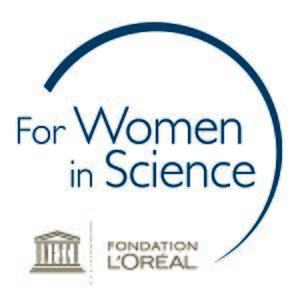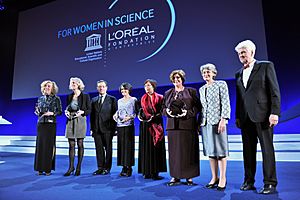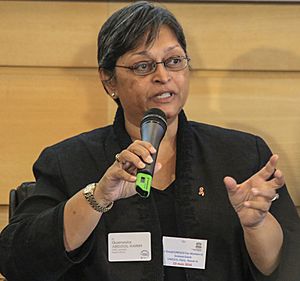L'Oréal-UNESCO For Women in Science Awards facts for kids
Quick facts for kids L'Oréal-UNESCO For Women in Science International Awards |
|
|---|---|

The L'Oréal-UNESCO For Women in Science Programme
|
The L'Oréal-UNESCO For Women in Science International Awards started in 1998. They aim to celebrate amazing women scientists. These awards recognize women researchers who have made big steps in science.
This award is a team effort between the L'Oréal company from France and UNESCO. UNESCO is the United Nations group for education, science, and culture. Each winner gets a grant of $100,000 USD. This award is also known as the L'Oréal-UNESCO Women in Science Awards.
Every year, a group of international judges picks five winners. They choose one scientist from each of these regions:
- Africa and the Arab States
- Asia and the Pacific
- Europe
- Latin America and the Caribbean
- North America (since 2000)
The types of science recognized change each year. In even years, they honor scientists in life sciences. In odd years (since 2003), they celebrate scientists in physical sciences, mathematics, and computer science.
The same partnership also gives out the UNESCO-L'Oréal International Fellowships. These fellowships give up to $40,000 USD over two years. They help fifteen young women scientists with their promising research projects. These awards started in 2000. In 2015, they were renamed Rising Talent Grants.
As of 2023, seven L'Oréal-UNESCO winners have also won a Nobel Prize. These include Elizabeth Blackburn (2008) and Ada Yonath (2009). More recent Nobel winners include Emmanuelle Charpentier (2020), Jennifer Doudna (2020), Katalin Karikó (2023), and Anne L'Huillier (2023). Christiane Nüsslein-Volhard won her Nobel Prize before this award.
Award Winners
This award celebrates women who have made huge impacts in science. The winners come from different parts of the world. They work in many exciting fields.
Key to Science Fields: Life sciences (LS), Life and Environmental Sciences (LES) Physical sciences, mathematics and computer science (PMC)
| Year | Winner for | Name | Nationality | Recognized for (her) | |
|---|---|---|---|---|---|
| 1998 | LS | Africa and the Arab States | Grace Oladunni Taylor | contributions to understanding heart diseases in Africa | |
| Asia and the Pacific | Myeong-Hee Yu | discoveries about how proteins fold and how this relates to human health | |||
| Europe | Pascale Cossart | explaining how harmful bacteria trick our body's defenses | |||
| Latin America and the Caribbean | Gloria Montenegro | efforts to use modern science to protect plant ecosystems | |||
| 2003 | PMC | Africa and the Arab States | Ayse Erzan | theoretical work on how tree-like structures form | |
| Asia and the Pacific | Li Fanghua | discovery of new methods in electron microscopy | |||
| Latin America and the Caribbean | Mariana Weissmann | theoretical studies on new forms of carbon | |||
| North America | Johanna M.H. Levelt Sengers | experiments on how fluids become cloudy at critical points | |||
| 2016 | LS | Africa and the Arab States | Quarraisha Abdool Karim | remarkable work to prevent and treat HIV, improving life for women in Africa | |
| Asia and the Pacific | Chen Hualan | outstanding research on the bird flu virus, leading to a useful vaccine | |||
| Europe | Emmanuelle Charpentier | game-changing discovery of a DNA editing technique to fix flawed genes | |||
| Latin America and the Caribbean | Andrea Gamarnik | key discoveries on how mosquito-borne viruses cause human diseases like Dengue Fever | |||
| North America | Jennifer Doudna | game-changing discovery of a DNA editing technique to fix flawed genes | |||
| 2023 | PMC | Africa and the Arab States | Suzana Nunes | outstanding work on new filter membranes for cleaner chemical separations | |
| Asia and the Pacific | Lidia Morawska | excellent research on air pollution and its effects on health and the environment | |||
| Europe | Frances Kirwan | exceptional work in pure mathematics, helping to classify geometric objects | |||
| Latin America and the Caribbean | Anamaría Font | important contributions to theoretical particle physics and String Theory | |||
| North America | Aviv Regev | pioneering work using math and computer science to study cell biology | |||
Special Tributes
In 2023, for the award's 25th anniversary, special honors were given. Three researchers who had to leave their home countries received a financial reward and a medal. These were Mursal Dawodi (Artificial Intelligence) from Afghanistan, Ann Al Sawoor (Mathematics) from Iraq, and Marycelin Baba (Molecular Biology) from Nigeria.
International Rising Talents
From 2000 to 2014, fellowships helped young women scientists. They could do research in labs outside their home countries.
In 2015, these became the International Rising Talent Grants. Each year, 15 PhD students and post-doctoral researchers receive these awards. They are chosen from many young women scientists around the world. These grants help them continue their important research.
See also
 In Spanish: Premios L'Oréal-UNESCO a Mujeres en Ciencia para niños
In Spanish: Premios L'Oréal-UNESCO a Mujeres en Ciencia para niños
- Women in science
- Women in chemistry
- Women in medicine
- Women in physics
- List of science and technology awards for women
- List of general science and technology awards
 | Madam C. J. Walker |
 | Janet Emerson Bashen |
 | Annie Turnbo Malone |
 | Maggie L. Walker |



